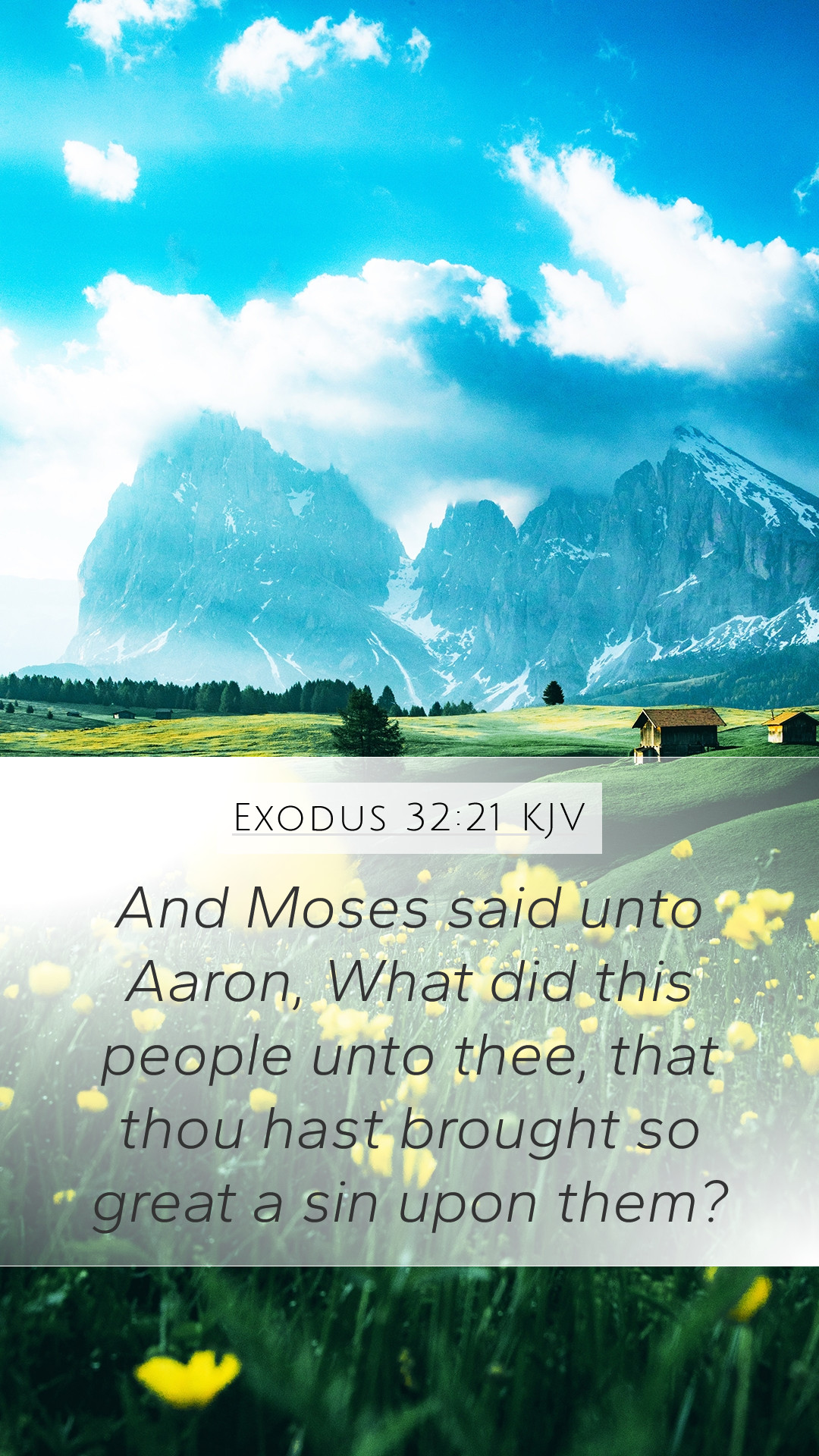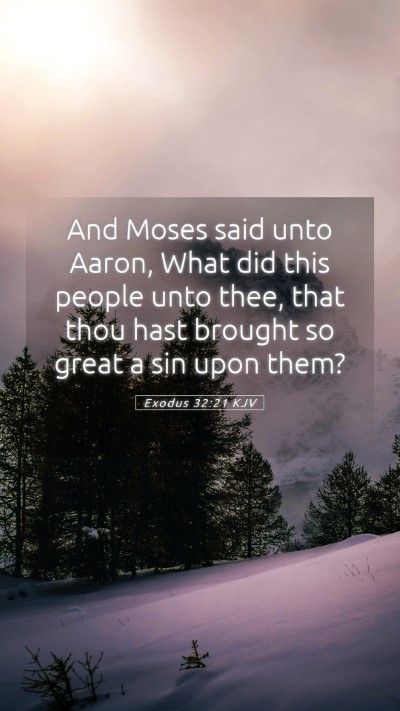Understanding Exodus 32:21
Exodus 32:21 states: "And Moses said unto Aaron, What did this people unto thee, that thou hast brought so great a sin upon them?" This verse occurs in a pivotal moment in the narrative of the Israelites' exodus from Egypt, specifically highlighting the aftermath of their idolatry when they created and worshiped the golden calf. Below we explore insights and implications derived from this scripture through the lens of public domain commentaries, enriching our understanding of Bible verse meanings and interpretations.
Contextual Background
This moment signifies a crisis of faith for the Israelites, as they turn to idolatry in Moses's absence. In the broader narrative of the Exodus, God has been revealed as faithful and powerful, yet the people, faced with uncertainty, resort to creating a tangible representation of divinity. The significance of Aaron’s actions and Moses's inquiry reveals profound lessons about leadership and accountability in faith communities.
Moses’s Inquiry: A Call for Reflection
Moses's question to Aaron serves as a pivotal point in the narrative. According to Matthew Henry, this inquiry reflects Moses's concern for the spiritual well-being of the people he leads, as he seeks to understand the reasons behind such great sin. The need for understanding Scripture is echoed here — Moses seeks not just to reprimand but to comprehend the motivations that drove the people to sin against God.
Leadership and Accountability
As noted by Albert Barnes, the inquiry underscores the responsibilities of leadership. Leaders like Aaron must be diligent and uphold the truth of God among the people. Aaron's failure to prevent this sin contrasts sharply with Moses's commitment to chastising the people upon his return, emphasizing the importance of strong biblical leadership.
Understanding the Nature of Sin
Adam Clarke points out that the phrase "what did this people unto thee" suggests a recognition of the communal nature of sin. It invites the reader to ponder how collective actions impact a community and how individual weaknesses in leadership can lead to widespread disobedience. This understanding is vital for those seeking Bible verse explanations regarding the dynamics of faith communities.
Theological Implications
This passage not only communicates historical facts but also theological truths relevant to modern readers. The swift transition from worshiping the true God to idolatry offers insight into human nature's propensity to stray under duress. The immediate need for a mediator — depicted through Moses — reveals the significant role of intercessory prayer in bringing believers back to God.
The Consequences of Idolatry
The consequences of idolatry highlighted in this passage resonate with contemporary themes of spiritual fidelity. The act of creating the golden calf became a grave sin for the Israelites, exemplifying the severity of turning away from God's commands. This is an essential lesson for those engaged in Bible study groups seeking to apply biblical principles to daily life.
Faith Crisis and God's Mercy
Moreover, the dialogue between Moses and Aaron allows for an exploration of faith crises and the mercy of God. Although the people's actions merit judgment, Moses’s role as an interceder illustrates the redemptive nature of God’s relationship with humanity. This juxtaposition is crucial in understanding difficult Bible passages concerning sin and salvation.
Bible Verse Commentary Summary
This verse serves as an important reminder of the significant weight that leaders bear in guiding their communities in faith, emphasizing the necessity for accountability, faithfulness, and the vigilance required to avoid sin. Moses's inquiry encourages believers to continually examine their actions and the collective impact on their communities, providing rich content for personal Bible study lessons or group discussions.
Cross References
- Exodus 20:4-5: The prohibition against idolatry.
- 1 Corinthians 10:7: A warning against idol worship.
- James 3:1: Acknowledging the greater judgment for teachers and leaders.
- Deuteronomy 9:12-14: God's anger towards Israel’s idolatry.
- Exodus 34:14: The necessity of devotion to the one true God.
Conclusion
In summary, Exodus 32:21 prompts deep reflection on the nature of leadership, communal responsibility in faith, and the importance of remaining steadfast in worship. This verse, when interpreted through careful biblical exegesis, unveils layers of meaning that resonate with modern believers, emphasizing both the accountability we bear and the grace extended through intercessory relationships. Engaging with such verses through Bible study insights equips believers to navigate challenging spiritual terrains effectively.


